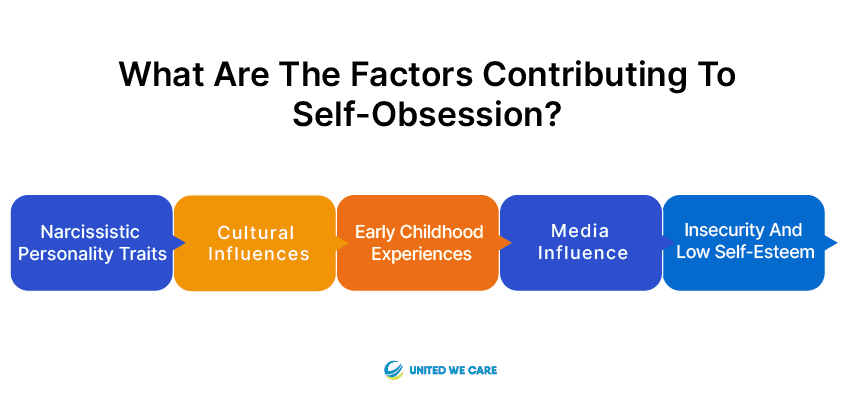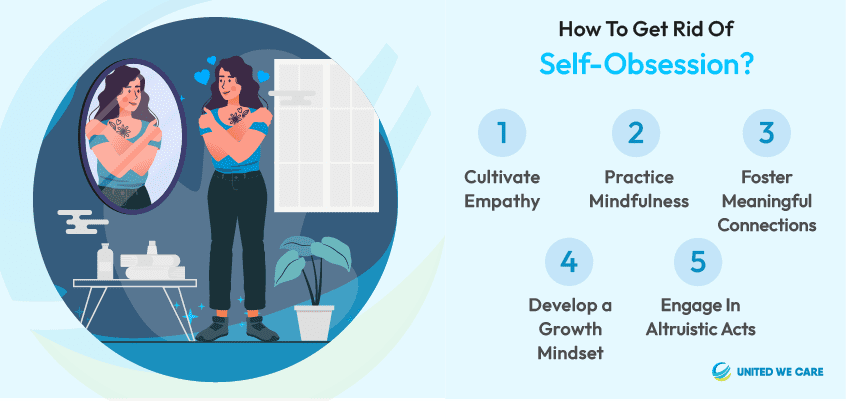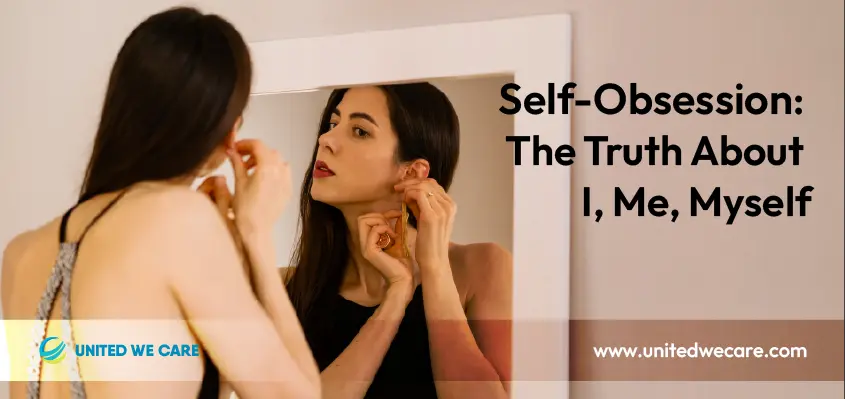Introduction
We are all told, at some point, to focus on ourselves and not the world around us. But what if, from doing it for a while, it becomes a habit where you only focus on yourself without caring about how your actions or words are impacting others? This self-centeredness is called ‘Self-obsession.’ Self-obsession can impact you and people around you drastically. In this article, let me share with you what self-obsession exactly means, its causes, how it impacts you and everyone around you, and how you can get rid of this behavior.
We are all so self-obsessed, not really helping others as we should, spreading the love. – Princess Superstar [1]
What is Self-Obsession?
While growing up, I heard a lot of my friends say, “You be you. The world will adjust.” To most people around me, it was all about self-love. While I am a big advocate for self-love, that statement sounded absolutely bizarre to me because, to me, you can’t expect the world to resolve as per you and around you. But then, I realized this had become a reality for a lot of people.
Self-obsession is when you excessively focus on just yourself. So much so that if someone remotely says anything about themselves, you will bring the focus back to your desires, achievements, issues, and appearance. It stems from having narcissistic tendencies. This self-centeredness could impact your thoughts, emotions, and behaviors and, therefore, your overall well-being [2].
If I give you examples of characters from TV shows and movies, the classic characters would be all the villains in them- Green Goblet in Spiderman, Joker in Batman, Haffaz Aladeen in The Dictator, etc. One good character who was self-obsessed was Iron Man, to the extent that he put himself first, even when it came to dangerous situations.
What are the Factors Contributing to Self-Obsession?
If you’re wondering why would someone become self-obsessed, then let me share certain factors that can contribute to your self-obsession [3]:

- Narcissistic Personality Traits: If you feel that you are superior to the people around you, then you are capable of becoming self-obsessed. You might feel that people around you should only praise you. You would, then, put your needs and desires above everyone else’s.
- Cultural Influences: Our society values people who have a sense of individuality and those who have achieved certain good things in life. So, if you have been an overachiever all your life, specifically materialistic, then the appreciation from society could be the reason behind you asking for validation from the outside world. In fact, certain cultures promote competitiveness. That’s another reason that can cause you to be self-obsessed.
- Early Childhood Experiences: If you have traits of self-obsession, then it’s highly likely that you grew up in an insecure environment where your parents or caregivers did not show you love but rather always criticized you. It can even be that your caregivers or parents praised you highly, hiding your flaws. Due to these experiences in your childhood, you might end up having a shakable sense of self-worth and the constant need to get approval from the outside world.
- Media Influence: Media plays a huge role in helping us develop a view of how our lives should be. Just like society, the media also appreciates only those who are successful, wealthy, and stand up to beauty standards. This exposure can make you become self-obsessed because if you idolize certain successful people, you would work to be them and would demand that you be appreciated and validated for your efforts.
- Insecurity and Low Self-Esteem: You might have developed self-obsession just to hide your insecurities and low sense of self-esteem. It’s possible that you feel inadequate, shameful, or even emotional pain. It could be that you are trying to protect yourself from potential rejection or criticism. So, just to hide these emotions from the world, you could be showing yourself as a self-obsessed and absolutely correct person.
What are the Effects of Self-Obsession?
Self-obsession can impact you and the people around you in a number of ways [4]:
- You might not be able to understand the emotions and viewpoints of people around you.
- Due to a lack of emotional intelligence, you might not be able to empathize with others.
- You might have quite non-serious and meaningless friendships and relationships, finding it difficult to build and maintain healthy relationships.
- You might work too hard to achieve perfection toward your personal goals, achievements, and desires.
- You might constantly be dissatisfied with your yourself, your relationships, the people around you, and your life.
- You might feel lonely and socially isolated since people may not want to associate with you.
- You might not get the opportunities you desired for self-improvement. This can stop your personal and professional growth.
- You might not accept feedback or criticism.
Read more about- Friend With Narcissistic Personality Disorder
How to Get Rid of Self-Obsession?
As complex and challenging self-obsession might seem, you can overcome these deep-rooted emotions [5]:

- Cultivate Empathy: You can begin by doing certain exercises that can help you bring out empathy in you. That way, you would be able to understand another person’s viewpoint as well. In fact, practicing empathy can help you understand yourself in a better manner as well. If you are kind and compassionate toward yourself and others, the traits of self-obsession will start to reduce.
- Practice Mindfulness: You can even practice Mindfulness techniques, such as meditation. These techniques can help you become more aware of your thought patterns and behaviors. You can learn to be in the present rather than in the past or in the future. That way, you can address all your insecurities and move toward personal growth, reducing thoughts of self-obsession.
- Foster Meaningful Connections: Just try talking to people without judging them or cutting their words and thoughts. Try to maintain a healthy relationship with them. That way, you can be more empathetic and respectful. These relationships around you can help you fight the urge to have all the attention to ourself.
- Develop a Growth Mindset: You need to build a growth mindset where you believe that there is a chance for personal growth and learning. That way, you can be open to feedback, challenges, and another person’s opinion as well. This can really help you to the cycle of self-obsession.
- Engage in Altruistic Acts: One of the best ways to let go of self-obsession is to help other people deal with their issues. Your one act of kindness can not only help a person or family, but it can also help you feel fulfilled and gain a sense of purpose. That way, you can also feel a part of the community.
Must Read- Hyperfixation
Conclusion
It’s good to focus on yourself at times, but if your only focus becomes you, then that can cause serious issues for you in the future. Self-obsession can harm you deeply. People usually don’t like talking or associating with people who only talk about themselves and don’t bother about what the other person is feeling or doing. It can result in social isolation and loneliness, making you feel good for nothing. Just try to be kind, empathetic, and compassionate toward yourself and the people around you. That way, you can start making more meaningful relationships around you, and it can really help you grow personally and professionally.
Seek support for self-obsession at United We Care. Connect with our expert counsellors and access a wealth of resources. Our dedicated team of wellness and mental health professionals will provide personalized guidance and effective methods to promote your overall well-being. Join us on a journey toward self-discovery and growth.
References
[1] “Princess Superstar Quote,” A-Z Quotes. https://www.azquotes.com/quote/1478524
[2] “17 Major Differences Between Loving Yourself And Self Obsession – SeeKen,” SeeKen, Feb. 04, 2023. https://seeken.org/differences-between-loving-yourself-and-self-obsession/
[3] M. Dambrun, “Self-centeredness and selflessness: happiness correlates and mediating psychological processes,” PeerJ, vol. 5, p. e3306, May 2017, doi: 10.7717/peerj.3306.
[4] “11 Signs Someone Might Be Self-Obsessed To Watch Out For,” Bustle, May 24, 2016. https://www.bustle.com/articles/161804-11-signs-someone-might-be-self-obsessed-to-watch-out-for
[5] B. Rana, “How To Overcome The Unhealthy Effects Of Self-Obsession? | Rana Heals,” Rana Heals, Nov. 16, 2020. https://ranaheals.com/how-to-overcome-the-unhealthy-effects-of-self-obsession/





